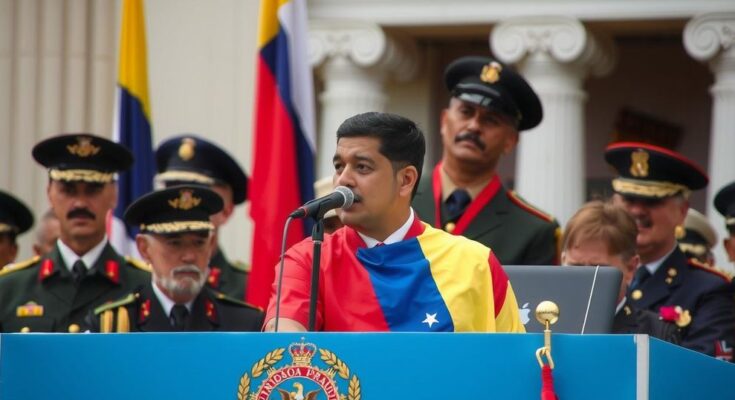Nicolás Maduro has been sworn in for a third term in Venezuela, amidst allegations of electoral fraud and significant protests claiming that his opponent Edmundo González actually won the election. Heavy police and military presence marked the inauguration, which was met with condemnation from international observers and ongoing calls for opposition leaders to be released from detention. Sanctions have been imposed by the European Union and the United States on Venezuelan officials, highlighting the deepening crisis in the country.
Venezuelan President Nicolás Maduro has officially been sworn in for a third consecutive six-year term amid significant contention and allegations of electoral fraud. Despite extensive protests and credible evidence suggesting that his opponent, Edmundo González, actually secured a victory in the July 28 election, Maduro declared the day as a “great Venezuelan victory.” The environment surrounding the inauguration was tightly secured by law enforcement and military personnel, indicating the heightened tensions in the country.
During his inauguration speech at the legislative palace, Maduro lashed out at the opposition and foreign powers, asserting that he owes his presidency neither to the United States nor to other foreign governments. Meanwhile, international reactions to Maduro’s continued rule have grown increasingly severe, with the European Union implementing sanctions against top Venezuelan officials following the disputed elections.
The opposition’s claims of electoral victory, supported by the U.S.-based Carter Center’s observations, present a stark contrast to the government’s assertions, stirring public outrage and leading to widespread protests across the nation. The situation escalated further when security forces reportedly detained María Corina Machado, a prominent opposition figure, amid rising calls for democracy and governmental accountability.
Maduro’s administration is characterized by allegations of systematic repression, with numerous individuals arrested during protests and claims of human rights violations emerging in the aftermath of the elections. The disputed results and the government’s heavy-handed response to dissent have compounded the instability in Venezuela, rendering the political landscape increasingly volatile.
As the world watches, the continued tension and allegations surrounding Nicolás Maduro’s presidency signify a challenging period ahead for Venezuelan democracy and governance.
The recent swearing-in of Nicolás Maduro as President of Venezuela occurs against a backdrop of serious controversy concerning the legitimacy of the July 28, 2024 election. Despite claims of his electoral win, notable evidence collected from opposition monitoring suggests that Maduro’s opponent, Edmundo González, might have received double the amount of votes. The election’s transparency has been heavily criticized, prompting international observers, including the Carter Center, to endorse the validity of the opposition’s tallies. This electoral dissonance has escalated into significant civil unrest and international sanctions against Venezuelan officials, amplifying concerns about democracy in the nation.
In conclusion, Nicolás Maduro’s inauguration marked a continuation of his contentious rule, overshadowed by severe allegations of electoral fraud and civil dissent. The ongoing repression against opposition forces and international condemnation reflect a period of instability and uncertainty in Venezuela. With Maduro’s presidency now extending until 2031, the future of Venezuelan democracy remains precarious, as protests against his government highlight widespread discontent and calls for accountability and reform in the nation’s governance.
Original Source: www.newsday.com




